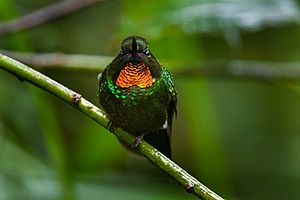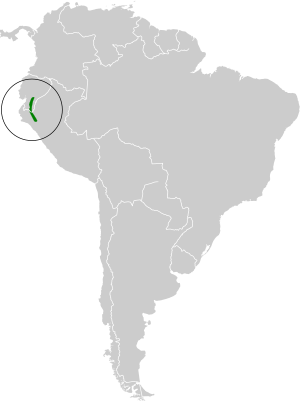Flame-throated sunangel facts for kids
Quick facts for kids Flame-throated sunangel |
|
|---|---|
 |
|
| Conservation status | |
| Scientific classification |
|
| Kingdom: | Animalia |
| Phylum: | Chordata |
| Class: | Aves |
| Order: | Apodiformes |
| Family: | Trochilidae |
| Genus: | Heliangelus |
| Species: |
H. micraster
|
| Binomial name | |
| Heliangelus micraster Gould, 1872
|
|
 |
|
| Script error: The function "autoWithCaption" does not exist. | |
Script error: No such module "Check for conflicting parameters".
The flame-throated sunangel (also called the little sunangel) is a beautiful type of hummingbird. You can find this tiny bird in the countries of Ecuador and Peru. Its scientific name is Heliangelus micraster. It belongs to a group of hummingbirds known as "coquettes."
Contents
About the Flame-Throated Sunangel
What is a Sunangel?
Sunangels are a group of hummingbirds. They are known for their bright, shiny throat patches. These patches often look like jewels. The flame-throated sunangel gets its name from its fiery orange throat.
Family Tree: How Scientists Classify This Bird
Scientists study how different animals are related. The flame-throated sunangel is closely related to another hummingbird called the gorgeted sunangel.
There are two main types, or subspecies, of the flame-throated sunangel:
- The first type is called H. m. micraster.
- The second type is H. m. cutervensis.
What Does the Flame-Throated Sunangel Look Like?
This hummingbird is quite small. It is about 10 to 11 centimeters (4 to 4.3 inches) long. It weighs only about 3.6 to 4.1 grams (0.13 to 0.14 ounces). That's lighter than a few paper clips!
Colors and Features
- Its beak is straight and blackish.
- Both male and female birds have dark metallic green feathers on their upper bodies.
- Their lower chests are also dark metallic green.
- Their bellies are grayish.
- The area near their tail is almost white.
- Their tails are a dark steel blue color.
Differences Between Males and Females
Adult male flame-throated sunangels have special features:
- They have a shiny blue-green patch just above their beak. This is called a frontlet.
- Their chin is a dark purplish blue.
- They have a bright, iridescent yellow-orange throat patch. This patch is called a gorget. It has a sparkling emerald green border.
Adult female birds look a bit different:
- They do not have the blue-green frontlet.
- Their chin is blackish.
- Their throat is white with green or dusky gray speckles. Sometimes they have a few shiny reddish-orange spots too.
Young birds look similar to the adult female. However, young males do not have the blackish chin. The H. m. cutervensis subspecies of male has a reddish-orange gorget.
Where Do Flame-Throated Sunangels Live?
These hummingbirds live in the Andes mountains.
- The main subspecies, H. m. micraster, lives on the eastern side of the Andes. You can find them from Ecuador's Morona-Santiago Province into northern Peru.
- The H. m. cutervensis subspecies lives in Peru's Department of Cajamarca.
Their Home: Habitat
Flame-throated sunangels like to live inside and at the edges of thick, mossy forests. They usually live at high elevations. This is typically between 2,300 and 3,400 meters (7,500 to 11,200 feet) above sea level. Sometimes, they can be found as low as 1,500 meters (4,900 feet).
How Do Flame-Throated Sunangels Behave?
Moving Around
These birds usually stay in one area. They are mostly sedentary. However, after they finish nesting, they might move to different heights in the mountains. This is called altitudinal dispersal.
What Do They Eat?
Flame-throated sunangels protect their favorite feeding spots. They mostly drink nectar from flowers. They usually find flowers that are low to medium height off the ground. They feed both inside the forest and along its edges. Female birds often fly into open, bushy areas to find food.
These hummingbirds often cling to flowers while they feed. They don't always hover like some other hummingbirds. They also catch insects. They do this by hawking, which means catching insects in the air from a perch. They also pick insects off plants, which is called gleaning.
Raising Their Young: Breeding
In Ecuador, the flame-throated sunangel's breeding season is from January to May. We don't know much about their breeding season in Peru. The female bird lays two white eggs. She also takes care of incubating (keeping warm) the eggs. Not much else is known about how these birds raise their young.
Their Call
The flame-throated sunangel has a distinct call. It sounds like a repeated dry "djit" or a more gravelly "drrt."
Conservation Status: Are They Safe?
The IUCN (International Union for Conservation of Nature) has assessed the flame-throated sunangel. They have listed it as a species of "Least Concern." This means that for now, it is not considered to be in danger of disappearing. However, we don't know exactly how many of these birds there are or if their numbers are changing. The species is common in some places but generally not seen everywhere.
See also
 In Spanish: Colibrí lucero para niños
In Spanish: Colibrí lucero para niños
Images for kids
 | Precious Adams |
 | Lauren Anderson |
 | Janet Collins |



